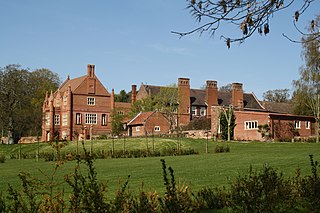This article relies largely or entirely on a single source .(July 2015) |
This is a list of fellows of the Royal Society elected in 1722. [1]
This article relies largely or entirely on a single source .(July 2015) |
This is a list of fellows of the Royal Society elected in 1722. [1]
The Master-General of the Ordnance (MGO) was a very senior British military position from 1415 to 2013 with some changes to the name, usually held by a serving general. The Master-General of the Ordnance was responsible for all British artillery, engineers, fortifications, military supplies, transport, field hospitals and much else, and was not subordinate to the commander-in chief of the British military. In March 2013 the holder was titled as "Director Land Capability and Transformation", but still sat on the Army Board as Master-General of the Ordnance; in September 2013 the post was eliminated.

The title Duke of Queensberry was created in the Peerage of Scotland on 3 February 1684 along with the subsidiary title Marquess of Dumfriesshire for the 1st Marquess of Queensberry. The Dukedom was held along with the Marquessate of Queensberry until the death of the 4th Duke in 1810, when the Marquessate was inherited by Sir Charles Douglas of Kelhead, 5th Baronet, while the Dukedom was inherited by the 3rd Duke of Buccleuch. Since then the title of Duke of Queensberry has been held by the Dukes of Buccleuch.

Charles FitzRoy, 2nd Duke of Grafton, was an Irish and English politician.
In English law, the justices in eyre were the highest magistrates, and presided over the court of justice-seat, a triennial court held to punish offenders against the forest law and enquire into the state of the forest and its officers.
Extraordinary Lords of Session were lay members of the Court of Session in Scotland from 1532 to 1762, and were part of the historical judiciary of Scotland.

General William Stanhope, 2nd Earl of Harrington was a British politician and soldier.
Gentleman of the Bedchamber was a title in the royal household of the Kingdom of England from the 11th century, later used also in the Kingdom of Great Britain. A Lord of the Bedchamber was a courtier in the Royal Household; the term being first used in 1718. Lords and Gentleman of the Bedchamber's duties originally consisted of assisting the monarch with dressing, waiting on him when he ate, guarding access to his bedchamber and closet and providing companionship. Such functions became less important over time but provided proximity to the monarch and the holders were thus trusted confidants and often extremely powerful. The offices were in the gift of The Crown and were originally sworn by Royal Warrant directed to the Lord Chamberlain.
Events from the year 1758 in Great Britain.

William Paston, 2nd Earl of Yarmouth of Oxnead, Norfolk and Turnham Green, Chiswick, Middlesex was a British peer and politician.

The Board of Ordnance in the Kingdom of Ireland (1542–1800) performed the equivalent duties of the British Board of Ordnance: supplying arms and munitions, overseeing the Royal Irish Artillery and the Irish Engineers, and maintaining the fortifications in the island.